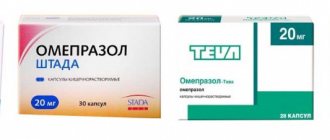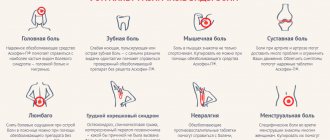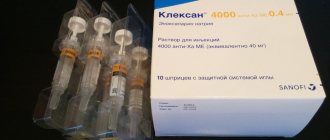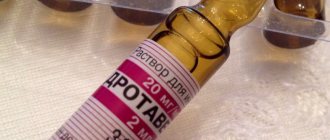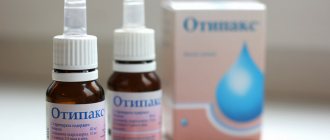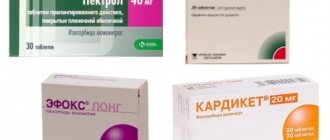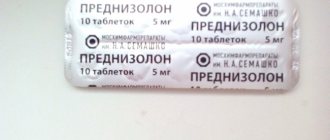Metypred - tablets
GCS inhibits the release of interleukin1, interleukin2, interferon gamma from lymphocytes and macrophages. It has anti-inflammatory, antiallergic, desensitizing, antishock, antitoxic and immunosuppressive effects.
Suppresses the release of ACTH and beta-lipotropin by the pituitary gland, but does not reduce the concentration of circulating beta-endorphin. Inhibits the secretion of TSH and FSH.
Increases the excitability of the central nervous system, reduces the number of lymphocytes and eosinophils, increases the number of red blood cells (stimulates the production of erythropoietins).
Interacts with specific cytoplasmic receptors and forms a complex that penetrates the cell nucleus and stimulates the synthesis of mRNA; the latter induces the formation of proteins, incl. lipocortin, mediating cellular effects. Lipocortin inhibits phospholipase A2, suppresses the release of arachidonic acid and suppresses the synthesis of endoperoxides, Pg, leukotrienes, which contribute to inflammation, allergies, etc.
Protein metabolism: reduces the amount of protein in plasma (due to globulins) with an increase in the albumin/globulin ratio, increases the synthesis of albumins in the liver and kidneys; enhances protein catabolism in muscle tissue.
Lipid metabolism: increases the synthesis of higher fatty acids and TG, redistributes fat (fat accumulation mainly in the shoulder girdle, face, abdomen), leads to the development of hypercholesterolemia.
Carbohydrate metabolism: increases the absorption of carbohydrates from the gastrointestinal tract; increases the activity of glucose-6-phosphatase, leading to an increase in the flow of glucose from the liver into the blood; increases the activity of phosphoenolpyruvate carboxylase and the synthesis of aminotransferases, leading to the activation of gluconeogenesis.
Water-electrolyte metabolism: retains Na+ and water in the body, stimulates the excretion of K+ (MCS activity), reduces the absorption of Ca2+ from the gastrointestinal tract, “washes out” Ca2+ from the bones, increases the excretion of Ca2+ by the kidneys.
The anti-inflammatory effect is associated with inhibition of the release of inflammatory mediators by eosinophils; inducing the formation of lipocortin and reducing the number of mast cells that produce hyaluronic acid; with a decrease in capillary permeability; stabilization of cell membranes and organelle membranes (especially lysosomal ones).
The antiallergic effect develops as a result of suppression of the synthesis and secretion of allergic mediators, inhibition of the release of histamine and other biologically active substances from sensitized mast cells and basophils, a decrease in the number of circulating basophils, suppression of the development of lymphoid and connective tissue, a decrease in the number of T- and B-lymphocytes, mast cells, reducing the sensitivity of effector cells to allergy mediators, inhibiting antibody formation, changing the body's immune response.
In COPD, the action is based mainly on inhibition of inflammatory processes, inhibition of development or prevention of swelling of the mucous membranes, inhibition of eosinophilic infiltration of the submucosal layer of the bronchial epithelium, deposition of circulating immune complexes in the bronchial mucosa, as well as inhibition of erosion and desquamation of the mucous membrane. Increases the sensitivity of beta-adrenergic receptors of small and medium-caliber bronchi to endogenous catecholamines and exogenous sympathomimetics, reduces the viscosity of mucus by inhibiting or reducing its production.
Antishock and antitoxic effects are associated with an increase in blood pressure (due to an increase in the concentration of circulating catecholamines and restoration of the sensitivity of adrenergic receptors to them, as well as vasoconstriction), a decrease in the permeability of the vascular wall, membrane protective properties, and activation of liver enzymes involved in the metabolism of endo- and xenobiotics.
The immunosuppressive effect is due to inhibition of the release of cytokines (interleukin1, interleukin2; interferon gamma) from lymphocytes and macrophages.
Suppresses the synthesis and secretion of ACTH and, secondarily, the synthesis of endogenous corticosteroids. Inhibits connective tissue reactions during the inflammatory process and reduces the possibility of scar tissue formation.
Release form and composition
The following dosage forms of Metipred are produced:
- Lyophilisate for preparing a solution for intravenous and intramuscular administration: lyophilized, white or slightly yellowish hygroscopic powder (in bottles of 0.25 g, the kit includes a solvent ampoule (colorless transparent liquid); 1 set in a cardboard pack);
- Tablets: active ingredient content 0.004 or 0.016 g, round in shape, beveled edge, with a transverse dividing line on one side, white or almost white, flat; tablets 0.016 g have the code “ORN 346” on one side (30 and 100 pcs. in dark glass bottles, 1 bottle in a cardboard pack; 30 and 100 pcs. in polyethylene containers, 1 container in a cardboard pack; by 30 pieces in plastic containers, 1 container in a cardboard pack).
One bottle of lyophilisate contains:
- Active ingredient: methylprednisolone (in the form of sodium succinate) – 0.25 g;
- Auxiliary component: sodium hydroxide;
- Solvent: water for injection.
One tablet contains:
- Active ingredient: methylprednisolone – 0.004 or 0.016 g;
- Auxiliary components: purified water, talc, lactose monohydrate, corn starch, gelatin, magnesium stearate.
Drug interactions
Methylprednisolone is a substrate of cytochrome enzymes and may therefore interfere with the effectiveness of other medications. Its drug interactions:
- increases the rate of isoniazid metabolism, weakens the effect of oral anticoagulants, anticholinesterase drugs, requires dose adjustment of antidiabetic drugs;
- protease inhibitors increase plasma concentrations of corticosteroids; Cyclosporine mutually inhibits the metabolism of methylprednisolone, causing seizures and convulsions;
- acetylsalicylic acid and other non-steroidal anti-inflammatory drugs increase the incidence of gastrointestinal bleeding;
- diuretics may lead to hypokalemia.
Contraindications
For short-term use of Metypred, the only contraindication is hypersensitivity to the components included in its composition.
In children, the use of glucocorticosteroids is possible only for absolute indications and under close medical supervision.
Conditions/diseases for which the drug should be used with caution:
- Diseases of the gastrointestinal tract (GIT): acute or latent peptic ulcer, gastritis, peptic ulcer of the stomach and duodenum, diverticulitis, esophagitis, ulcerative colitis with the threat of perforation or abscess formation, recently created intestinal anastomosis;
- Hypoalbuminemia and conditions predisposing to its occurrence;
- Infectious and parasitic diseases of fungal, bacterial or viral origin (currently or recently suffered, including recent contact with a patient): chicken pox, herpes simplex, systemic mycosis, measles, strongyloidiasis, herpes zoster (viremic phase), amoebiasis; active and latent tuberculosis (use for severe infectious diseases is permissible only with specific therapy);
- Open-angle and closed-angle glaucoma, myasthenia gravis, poliomyelitis (except for the form of bulbar encephalitis), acute psychosis, systemic osteoporosis;
- Diseases of the cardiovascular system (including recent myocardial infarction), arterial hypertension, hyperlipidemia, severe chronic heart failure;
- Pre- and post-vaccination period (56 days before and 14 days after vaccination), immunodeficiency conditions (including HIV infection or acquired immunodeficiency syndrome), lymphadenitis after vaccination with Bacillus Calmette-Guerin (BCG);
- Severe chronic renal and/or liver failure, nephrourolithiasis;
- Endocrine diseases: Itsenko-Cushing's disease, III-IV degree of obesity, hypothyroidism, diabetes mellitus (including impaired carbohydrate tolerance), thyrotoxicosis;
- Pregnancy.
Indications for use
What diseases require hormonal drugs to be cured? For what ailments is Metipred indicated? Why is this medicine prescribed?
First of all, the prescription of this medicine is mandatory for systemic connective tissue diseases. These include: systemic scleroderma, systemic lupus erythematosus, all vasculitis, dermatomyositis. In these cases, the hormone helps reduce the inflammatory process and restore metabolism in the affected tissues.
Metipred is also widely used in rheumatology. Indications for use: acute inflammatory diseases of the joints: arthritis of gouty and psoriatic etiology, osteoarthritis, bursitis, synovitis, ankylosing spondylitis. The main effect of the drug in these diseases is anti-inflammatory and analgesic.
You can use "Metypred" for bronchial asthma and various chronic allergic diseases.
special instructions
Before using Metipred, you should carefully study the instructions. The special instructions section contains useful rules and warnings:
- GCS increase susceptibility to infections, so during treatment you should carefully monitor your immunity and do not vaccinate;
- the drug successfully treats only fulminant and disseminated forms of tuberculosis; it is not recommended to take the drug for septic shock, Cushing's syndrome;
- During treatment with Metipred, Kaposi's sarcoma may develop and allergic reactions may occur;
- long-term therapy can lead to suppression of the hypothalamic-pituitary-adrenal system, the development of acute adrenal insufficiency and death, the occurrence of cataracts, and increased intraocular pressure;
- Metypred is prescribed with caution for seizures, myasthenia gravis;
- GCS therapy can mask latent symptoms of peptic ulcer, cause increased blood pressure, and increase potassium excretion;
- Children should be treated with Metypred with caution as this may lead to growth retardation, pancreatitis and increased intracranial pressure.
Importance of using the drug
This medicine cannot simply be bought at a pharmacy. Only the attending physician can issue a prescription for Metipred. Indications for use must be compelling (for example, systemic inflammatory diseases). Only in this case will the pharmacist be able to give you the drug you need.
Another feature of the drug is that with its long-term use, addiction or withdrawal symptoms may occur.
It develops when Metipred is prescribed for a long time and in large doses. In parallel, there is a suppression of one’s own hormones produced in the adrenal glands. In this case, you should not immediately discontinue the drug. It is recommended to gradually reduce the dose over a long period of time. Only under such conditions can normal hormone synthesis be restored.
Directions for use and dosage
Metypred tablets should be taken orally during or after meals with a small amount of liquid.
The full daily dose of the drug is taken once; double daily dose - after 1 day, when taking it, the circadian rhythm of endogenous secretion of GCS should be taken into account in the interval from 6 to 8 am; a high daily dose can be divided into 2-4 doses (it is recommended to take most of it in the morning).
The initial daily dose of Metipred depends on the nature of the disease and can vary between 0.004-0.048 g. For less severe pathologies, lower doses are usually sufficient, but in some cases higher doses are also possible. An increase in the dosage of the drug may also be required in the following cases:
- Cerebral edema: 0.2-1 g per day;
- Multiple sclerosis: 0.2 g per day;
- Organ transplantation: up to 0.007 g/kg per day.
If there is no satisfactory clinical effect after a sufficient period of time, the drug should be discontinued and another type of treatment should be prescribed.
For children, the daily dose of the drug is determined by the doctor individually, depending on the surface area or body weight. In cases of adrenal insufficiency, the daily dose is 0.00333 g per 1 m2 or 0.00018 g/kg, the frequency of administration is 3 times a day; for other indications - 0.0125-0.05 g per 1 m2 or 0.00042-0.00167 g/kg, frequency of administration - 3 times a day.
Long-term therapy with tablets should not be stopped suddenly; a gradual reduction in the daily dose is recommended.
The solution prepared from Metypred lyophilisate is administered in the form of intravenous infusions, slow intravenous jet injections, and intramuscular injections.
Immediately before use, the supplied solvent should be added to the bottle containing the lyophilisate. The resulting solution contains 0.0625 g/ml methylprednisolone.
In cases of life-threatening conditions, the drug, as an additional treatment, is administered intravenously over 30 minutes at a dose of 0.03 g/kg every 6-8 hours for no more than 48 hours.
Recommended doses of the drug for pulse therapy for the treatment of pathologies for which the use of GCS is effective, exacerbations of pathologies and/or ineffectiveness of standard therapy:
- Edema conditions (lupus nephritis, glomerulonephritis, etc.): 0.03 g/kg intravenously every other day for 4 days or 1 g per day for 3, 5 or 7 days;
- Rheumatic diseases: 1 g per day intravenously for 1-4 days or 1 g per month intravenously for 6 months;
- Multiple sclerosis: 1 g per day intravenously for 3 or 5 days;
- Systemic lupus erythematosus: 1 g per day intravenously for 3 days.
The solution for pulse therapy is recommended to be administered over 30 minutes (at least). If no improvement is achieved within 7 days after treatment (and also if the patient’s condition requires it), the drug may be re-administered.
In cases of cancer, to improve the quality of life of a patient in the terminal stage, 0.125 g of Metipred per day is administered intravenously every day for 56 days.
For chemotherapy characterized by a slight or moderate emetic effect, 0.25 g of the drug is administered intravenously over 5 minutes (at least) 1 hour before using the chemotherapy drug, at the beginning of chemotherapy, and also after it. For chemotherapy characterized by a pronounced emetic effect, 0.25 g of the drug is administered intravenously over 5 minutes (at least) in combination with appropriate doses of butyrophenone or metoclopramide 1 hour before the administration of the chemotherapy drug, then at the beginning of chemotherapy and after it, 0. 25 g solution intravenously.
The initial dose of Metipred for other indications varies between 0.01-0.5 g, depending on the nature of the disease, and is administered by intramuscular injection.
In cases of severe conditions, higher doses may be required for a short course of treatment. The initial dose, not exceeding 0.25 g, is administered intravenously over 5 minutes (not less); exceeding 0.25 g - intravenously over 30 minutes (at least). Next, doses are administered intravenously or intramuscularly, observing the interval between administrations, determined depending on the clinical condition and the patient’s response to treatment.
For children, the drug is recommended to be used in smaller doses (however, not less than 0.0005 g/kg body weight per day). First of all, when selecting a dose, the severity of the patient’s condition and his response to therapy should be taken into account, and not body weight and age.
